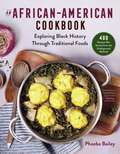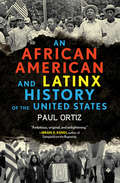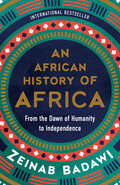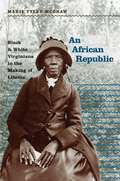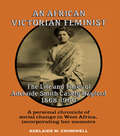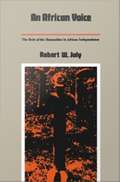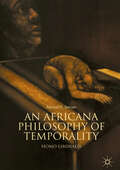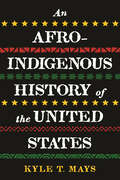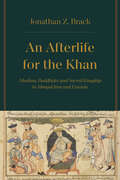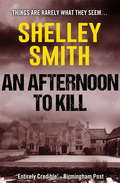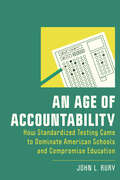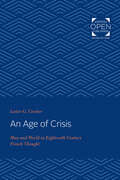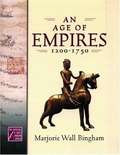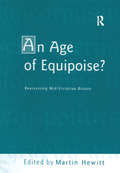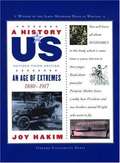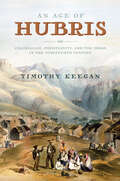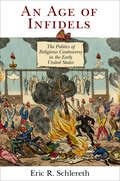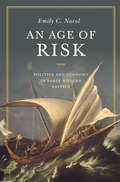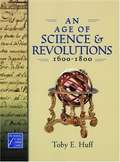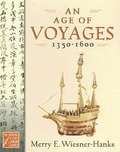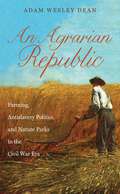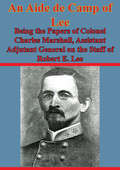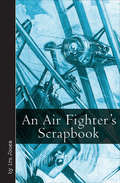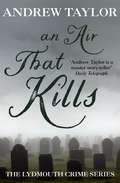- Table View
- List View
An African American Cookbook: Exploring Black History and Culture Through Traditional Foods
by Phoebe Bailey400 Soul Food Recipes for Appetizers, Main Meals, Breads, Pies, Cakes, Salads, and More!An African American Cookbook: Exploring Black History and Culture Through Traditional Foods is a bountiful collection of favorite foods and the memories that go with them. The foods reflect the ingenious, resourceful, and imaginative Africans who made them. Woven among the four hundred recipes are rich historic anecdotes and sayings. They were discovered or lived by the cookbook&’s contributors, many of whose ancestors participated in the Underground Railroad or lived near where it was active. This is a cookbook rich in history and rich in easy-to-prepare, wonderfully tasty food! Recipes include: • Collard greens with ham hocks • Cornbread sausage stuffing • Smoked turkey and black-eyed peas • Pan-fried okra • Fried green tomatoes • 14-day sweet pickles • Yogurt and chives biscuits • Sweet potato pie • And more! Author Phoebe Bailey&’s congregation in historic Lancaster, Pennsylvania, has a long history with Underground Railroad activity. Today they offer Underground Railroad reenactments and a buffet of traditional African American food to their many visitors. This cookbook celebrates those historic events, when this church fed and then helped to spirit enslaved Africans to safety.
An African American and Latinx History of the United States
by Paul OrtizAn intersectional history of the shared struggle for African American and Latinx civil rightsSpanning more than two hundred years, An African American and Latinx History of the United States is a revolutionary, politically charged narrative history arguing that the “Global South” was crucial to the development of America as we know it. Ortiz challenges the notion of westward progress, as exalted by widely taught formulations such as “manifest destiny” and “Jacksonian democracy,” and shows how placing African American, Latinx, and Indigenous voices unapologetically front and center transforms American history into the story of the working class organizing against imperialism.In precise detail, Ortiz traces this untold history from the Jim Crow-esque racial segregation of the Southwest, the rise and violent fall of a powerful tradition of Mexican labor organizing in the twentieth century, to May 1, 2006, International Workers’ Day, when migrant laborers—Chicana/os, Afro-Cubanos, and immigrants from nearly every continent on earth—united in resistance on the first “Day Without Immigrants.”Incisive and timely, An African American and Latinx History of the United States is a bottom-up history told from the viewpoint of African American and Latinx activists and revealing the radically different ways people of the diaspora addressed issues still plaguing the United States today.
An African History of Africa: From the Dawn of Humanity to Independence
by Zeinab BadawiAlready a major international bestseller, Zeinab Badawi’s sweeping and much-needed survey of African history traces the continent’s extraordinary legacy from prehistory to the present from the African perspective.“Equal parts gripping and galvanizing. . . . Researched across more than 30 countries, it brings the dazzling civilizations of pre-colonial Africa vividly to life. A book that feels both long-overdue—and wholly worth the wait.” —British VogueEveryone is originally from Africa, and this book is therefore for everyone.For too long, Africa’s history has been dominated by western narratives of slavery and colonialism, or simply ignored. Now, Zeinab Badawi sets the record straight.In this fascinating book, Badawi guides us through Africa’s spectacular history—from the very origins of our species, through ancient civilizations and medieval empires with remarkable queens and kings, to the miseries of conquest and the elation of independence. Visiting more than thirty African countries to interview countless historians, anthropologists, archaeologists and local storytellers, she unearths buried histories from across the continent and gives Africa its rightful place in our global story.The result is a gripping new account of Africa: an epic, sweeping history of the oldest inhabited continent on the planet, told through the voices of Africans themselves.
An African Republic
by Marie Tyler-McgrawThe nineteenth-century American Colonization Society (ACS) project of persuading all American free blacks to emigrate to the ACS colony of Liberia could never be accomplished. Few free blacks volunteered, and greater numbers would have overwhelmed the meager resources of the ACS. Given that reality, who supported African colonization and why? No state was more involved with the project than Virginia, where white Virginians provided much of the political and organizational leadership and black Virginians provided a majority of the emigrants.In An African Republic, Marie Tyler-McGraw traces the parallel but seldom intersecting tracks of black and white Virginians' interests in African colonization, from revolutionary-era efforts at emancipation legislation to African American churches' concern for African missions. In Virginia, African colonization attracted aging revolutionaries, republican mothers and their daughters, bondpersons schooled and emancipated for Liberia, evangelical planters and merchants, urban free blacks, opportunistic politicians, Quakers, and gentlemen novelists. An African Republic follows the experiences of the emigrants from Virginia to Liberia, where some became the leadership class, consciously seeking to demonstrate black abilities, while others found greater hardship and early death. Tyler-McGraw carefully examines the tensions between racial identities, domestic visions, and republican citizenship in Virginia and Liberia.
An African Slaving Port and the Atlantic World: Benguela and Its Hinterland
by Mariana P. CandidoThis book traces the history and development of the port of Benguela, the third largest port of slave embarkation on the coast of Africa, from the early seventeenth to the mid-nineteenth century. Benguela, located on the central coast of present-day Angola, was founded by the Portuguese in the early seventeenth century. In discussing the impact of the trans-Atlantic slave trade on African societies, Mariana P. Candido explores the formation of new elites, the collapse of old states, and the emergence of new states. Placing Benguela in an Atlantic perspective, this study shows how events in the Caribbean and Brazil affected social and political changes on the African coast. This book emphasizes the importance of the South Atlantic as a space for the circulation of people, ideas, and crops.
An African Victorian Feminist: The Life and Times of Adelaide Smith Casely Hayford 1848-1960
by Adelaide M CromwellFirst published in 2004. Routledge is an imprint of Taylor & Francis, an informa company.
An African Voice: The Role of the Humanities in African Independence
by Robert W. JulyThrough the work of leading African writers, artists, musicians and educators-from Nobel prizewinner Wole Soyinka to names hardly known outside their native lands-An African Voice describes the contributions of the humanities to the achievement of independence for the peoples of black Africa following the Second World War. While concentrating on cultural independence, these leading humanists also demonstrate the intimate connection between cultural freedom and genuine political economic liberty.
An Africana Philosophy of Temporality: Homo Liminalis
by Michael E. SawyerThis book is a timely intervention in the areas of philosophy, history, and literature. As an exploration of the modern political order and its racial genealogy, it emerges at a moment when scholars and activists alike are wrestling with how to understand subject formation from the perspective of the subordinated rather than from dominant social and philosophical modes of thought. For Sawyer, studying the formation of racialized subjects requires a new imagining of marginalized subjects. Black subjectivity is not viewed from the static imaginings of social death, alienation, ongoing abjection, or as a confrontation with the treat of oblivion. Sawyer innovates the term "fractured temporality," conceptualizing Black subjects as moving within and across temporalities in transition, incorporated, yet excluded, marked with the social death of Atlantic slavery and the emergent political orders it etched, and still capable of exerting revolutionary force that acts upon, against, and through racial oppression.
An Afro-Indigenous History of the United States
by Kyle T. MaysThe first intersectional history of the Black and Native American struggle for freedom in our country that also reframes our understanding of who was Indigenous in early AmericaBeginning with pre-Revolutionary America and moving into the movement for Black lives and contemporary Indigenous activism, Afro-Indigenous historian, Kyle T. Mays argues that the foundations of the US are rooted in antiblackness and settler colonialism, and that these parallel oppressions continue into the present. He explores how Black and Indigenous peoples have always resisted and struggled for freedom, sometimes together, and sometimes apart. Whether to end African enslavement and Indigenous removal or eradicate capitalism and colonialism, Mays show how the fervor of Black and Indigenous peoples calls for justice have consistently sought to uproot white supremacy.Mays uses a wide-array of historical activists and pop culture icons, &“sacred&” texts, and foundational texts like the Declaration of Independence and Democracy in America. He covers the civil rights movement and freedom struggles of the 1960s and 1970s, and explores current debates around the use of Native American imagery and the cultural appropriation of Black culture. Mays compels us to rethink both our history as well as contemporary debates and to imagine the powerful possibilities of Afro-Indigenous solidarity.
An Afterlife for the Khan: Muslims, Buddhists, and Sacred Kingship in Mongol Iran and Eurasia
by Dr. Jonathan Z. BrackIn the Mongol Empire, the interfaith court provided a contested arena for a performance of the Mongol ruler’s sacred kingship, and the debate was fiercely ideological and religious. At the court of the newly established Ilkhanate, Muslim administrators, Buddhist monks, and Christian clergy all attempted to sway their imperial overlords, arguing fiercely over the proper role of the king and his government, with momentous and far-reaching consequences. Focusing on the famous but understudied figure of the grand vizier Rashid al-Din, a Persian Jew who converted to Islam, Jonathan Z. Brack explores the myriad ways Rashid al-Din and his fellow courtiers investigated, reformulated, and transformed long-standing ideas of authority and power. Out of this intellectual ferment of accommodation, resistance, and experimentation, they developed a completely new understanding of sacred kingship. This new ideal, and the political theology it subtends, would go on to become a central justification in imperial projects across Eurasia in the centuries that followed. An Afterlife for the Khan offers a powerful cultural and intellectual history of this pivotal moment for Islam and empire in the Middle East and Asia.
An Afternoon to Kill
by Shelley SmithThis Victorian mystery with twists and turns will keep you gripped until the very last page: “Prim and petticoated and poisonous” (Kirkus Reviews, starred review). Lancelot Jones was on his way to his first job—as tutor to an Indian Rajah’s son. But the Rajah’s ancient plane and incompetent pilot dropped him in the middle of a desert. The wrong desert, at that. Seeking shade, he finds the only dwelling of any size within miles and its curious owner, an old Englishwoman named Alva Hine. Taking him into her home, Alva begins to tell Lancelot an incredible tale. She tells him a strange story of a summer fifty years ago, of love and hate and murder in a respectable middle-class Victorian household . . . And as the afternoon wears on, Alva’s story begins to take on an increasingly sinister note for the weary Mr. Jones. Soon, he has more than one reason to want to hear the end of the story . . . “[An] amazing novel . . . I am completely under the spell of this fine writer.” —Pretty Sinister Books “Entirely credible.” —Birmingham Post
An Age of Accountability: How Standardized Testing Came to Dominate American Schools and Compromise Education (New Directions in the History of Education)
by John L. RuryAn Age of Accountability highlights the role of test-based accountability as a policy framework in American education from 1970 to 2020. For more than half a century, the quest to hold schools and educators accountable for academic achievement has relied almost exclusively on standardized assessment. The theory of change embedded in almost all test-based accountability programs held that assessment with stipulated consequences could lead to major improvements in schools. This was accomplished politically by proclaiming lofty goals of attaining universal proficiency and closing achievement gaps, which repeatedly failed to materialize. But even after very clear disappointments, no other policy framework has emerged to challenge its hegemony. The American public today has little confidence in institutions to improve the quality of goods and services they provide, especially in the public sector. As a consequence, many Americans continue to believe that accountability remains a vital necessity, even if educators and policy scholars disagree.
An Age of Crisis: Man and World in Eighteenth Century French Thought (Goucher Colloquium)
by Lester G. CrockerOriginally published in 1959. This book examines the French Enlightenment by analyzing critical thought in eighteenth-centruy France. It examines the philosophes' views on evil, free will and determinism, and human nature. This is an interesting group to look at, according to Crocker, because French Enlightenment thinkers straddled two vastly different time periods.
An Age of Empires, 1200-1750 (The Medieval and Early Modern World #4)
by Marjorie Wall BinghamThe Age of Empires includes some of the most colorful, ruthless, and restless figures in all of history. During this time Genghis Khan told his troops to "fall upon the enemy like falcons," Ivan the Terrible expelled Mongol invaders from Russia but murdered his own son in a fit of rage, and Babur the Tiger ruled India, combining ferocity on the battlefield with a love of books and poetry.
An Age of Equipoise? Reassessing mid-Victorian Britain
by Martin HewittThe Age of Equipoise by W.L Burn was published in 1964 and became a central text in the canon of interpretations of the Victorian period. The book subsequently fell out of favour but recent claims to establish a new interpretative standard have, paradoxically, prompted reviewers to cast back to Burn's work as the orthodox standard against which such claims should be judged. The essays in this volume by British and American contributors all engage, to varying degrees, with the notion of 'equipoise' and how it can help to illuminate the mid-Victorian period in ways which alternative formulations cannot. Some of the chapters develop arguments embedded in Burn's own book; others take up issues largely absent in The Age of Equipoise, such as the position of children, Britain's interaction with the wider world, and the threats the period experienced to its concept of masculine identity. Together the essays demonstrate the intricacy and turbulence of the forces of cohesion in Victorian society, along with the success of that culture in achieving a working, if shifting, modus vivendi. Moreover, they substantiate the argument that, whatever the limitations of Burn's work, 'equipoise' deserves rehabilitation as a powerful conceptual framework for making sense of mid-Victorian Britain. About the Editor: Martin Hewitt is Director of the Leeds Centre for Victorian Studies and editor of the Journal of Victorian Culture. With Robert Poole he has recently produced an edition of The Diaries of Samuel Bamford, 1858-61 (Sutton, 2000).
An Age of Extremes (A History of Us #8)
by Joy HakimFor the captains of industry men like Andrew Carnegie, John D. Rockefeller, J. P. Morgan, and Henry Ford, the Gilded Age was a time of big money. Technology boomed with the invention of trains, telephones, electric lights, harvesters, vacuum cleaners, and more. But for millions of immigrant workers, it was a time of big struggles, with adults and children alike working 12 to 14 hours a day under extreme, dangerous conditions. The disparity between the rich and the poor was dismaying, which prompted some people to action. In An Age of Extremes, you'll meet Mother Jones, Ida Tarbell, Big Bill Haywood, Sam Gompers, and other movers and shakers, and get swept up in the enthusiasm of Teddy Roosevelt. You'll also watch the United States take its greatest role on the world stage since the Revolution, as it enters the bloody battlefields of Europe in World War I. [This text is listed as an example that meets Common Core Standards in English language arts in grades 4-5 at http://www.corestandards.org.]
An Age of Hubris: Colonialism, Christianity, and the Xhosa in the Nineteenth Century (Reconsiderations in Southern African History)
by Timothy KeeganAn Age of Hubris is the first comprehensive overview of the impact of missionary enterprise on the Xhosa chiefdoms of South Africa in the first half of the nineteenth century, chronicling a world punctuated by war and millenarian eruptions, and the steady encroachment of settler land hunger and colonial hegemony. With it, Timothy Keegan contributes new approaches to Xhosa history and, most important, a new dimension to the much-trodden but still vital topic of the impact—cultural, social, and political—of missionary activity among African peoples.The most significant historical works on the Xhosa have either become dated, foreground imperial-colonial history, or remain heavily theoretical in nature. In contrast, Keegan draws fruitfully on the rich Africanist comparative and anthropological literature now available, as well as extant primary sources, to foreground the Xhosa themselves in this crucial work. In so doing, he highlights the ways in which Africans utilized new ideas, resources, and practices to make sense of, react to, and resist the forces of colonial dispossession confronting them, emphasizing missionary frustration and African agency.
An Age of Infidels
by Eric R. SchlerethHistorian Eric R. Schlereth places religious conflict at the center of early American political culture. He shows ordinary Americans--both faithful believers and Christianity's staunchest critics--struggling with questions about the meaning of tolerance and the limits of religious freedom. In doing so, he casts new light on the ways Americans reconciled their varied religious beliefs with political change at a formative moment in the nation's cultural life.After the American Revolution, citizens of the new nation felt no guarantee that they would avoid the mire of religious and political conflict that had gripped much of Europe for three centuries. Debates thus erupted in the new United States about how or even if long-standing religious beliefs, institutions, and traditions could be accommodated within a new republican political order that encouraged suspicion of inherited traditions. Public life in the period included contentious arguments over the best way to ensure a compatible relationship between diverse religious beliefs and the nation's recent political developments.In the process, religion and politics in the early United States were remade to fit each other. From the 1770s onward, Americans created a political rather than legal boundary between acceptable and unacceptable religious expression, one defined in reference to infidelity. Conflicts occurred most commonly between deists and their opponents who perceived deists' anti-Christian opinions as increasingly influential in American culture and politics. Exploring these controversies, Schlereth explains how Americans navigated questions of religious truth and difference in an age of emerging religious liberty.
An Age of Risk: Politics and Economy in Early Modern Britain
by Emily NacolIn An Age of Risk, Emily Nacol shows that risk, now treated as a permanent feature of our lives, did not always govern understandings of the future. Focusing on the epistemological, political, and economic writings of Thomas Hobbes, John Locke, David Hume, and Adam Smith, Nacol explains that in seventeenth- and eighteenth-century Britain, political and economic thinkers reimagined the future as a terrain of risk, characterized by probabilistic calculation, prediction, and control. In these early modern sources, Nacol contends, we see three crucial developments in thought on risk and politics. While early modern thinkers differentiated uncertainty about the future from probabilistic calculations of risk, they remained attentive to the ways uncertainty and risk remained in a conceptual tangle, a problem that constrained good decision making. They developed sophisticated theories of trust and credit as crucial background conditions for prudent risk-taking, and offered complex depictions of the relationships and behaviors that would make risk-taking more palatable. They also developed two narratives that persist in subsequent accounts of risk--risk as a threat to security, and risk as an opportunity for profit. Looking at how these narratives are entwined in early modern thought, Nacol locates the origins of our own ambivalence about risk-taking. By the end of the eighteenth century, she argues, a new type of political actor would emerge from this ambivalence, one who approached risk with fear rather than hope.By placing a fresh lens on early modern writing, An Age of Risk demonstrates how new and evolving orientations toward risk influenced approaches to politics and commerce that continue to this day.
An Age of Science and Revolutions, 1600-1800 (The Medieval and Early Modern World #6)
by Toby E. HuffAn Age of Science and Revolutions, 1600-1800, tells the colorful story of a pivotal period in human history, an era that is crucial to understanding our own times. The expansion of trade and city life, the spread and reform of religious institutions, the rise of regional empires and local feudal regimes, and revolutionary advances in science and technology laid the foundation for the modern world. Told through the words and experiences of the people who lived it- kings, queens, and commoners, priests and lay people, explorers, scientists, artists, and world travelers- this is a world history for a new generation.
An Age of Voyages, 1350-1600 (The Medieval and Early Modern World #5)
by Merry E. Wiesner-HanksCultural life flowered from the mid-fifteenth century in the Italian city-states, many of which profited from the new trading opportunities that growing world networks permitted. Contact among regions of the world expanded, bringing new ideas and prompting an appreciation of arts and letters--not only of the present but of the past. In Italy this cultural flowering was known at first as the renaissance of arts and letters, soon shortened to just "Renaissance" to accommodate cultural ingredients that came from beyond Europe. Italian and northern European cultural expansion benefited from similar retrieval of ancient knowledge in the Islamic world and East Asia. Like the Italians, the Chinese had grown even wealthier from the extensive links to global commerce provided by the Mongol Empire, but once thrown off, their cultural life flourished under the Ming. Cultural knowledge and the arts spread across Asia and into Europe. As part of state-building, the Ming nourished commerce but also rejected the cosmopolitan Buddhist legacy that arrived from central and south Asia. To strengthen dynastic Chinese rule, the Ming challenged Buddhism with a revival of age-old concern for the Confucian values that had languished under the Mongols. Foremost among these new Confucians was Wu Yube, so expert in his teachings that he attracted a wide coterie of disciples. In India, Nanak, an educated employee of an Afghan prince, sparked the founding of Sikhism. A similar search for reviving fundamental religious values occurred in Europe, where Martin Luther challenged the practices of the Catholic church, ushering in Protestantism. Religious reform and resistance to it were closely connected to the state-building efforts of enterprising monarchs such as Henry VIII of England. India likewise experienced a fervent movement to revive pure, ancient religious practices. Fourteenth and fifteenth century global trade and long-distance ventures such as those made by the Ming and then by the Portuguese further inspired and advanced these worldwide cultural and political developments. A brisk Indian Ocean trade flourished. Economic change ensued with the arrival of New World silver on the global market. The advance of printing not only furthered the cause of religious reform and state-building globally; it also helped globalize knowledge and intellectual experimentation. People of great power and those of more limited means came to live their lives differently because of this expanding web of shared knowledge and trade. Cities flourished, the enslavement of native Americans came to replace their use as human sacrifices, and diseases migrated at a more rapid pace and greater devastation than perhaps ever before.
An Agrarian Republic
by Adam Wesley DeanThe familiar story of the Civil War tells of a predominately agricultural South pitted against a rapidly industrializing North. However, Adam Wesley Dean argues that the Republican Party's political ideology was fundamentally agrarian. Believing that small farms owned by families for generations led to a model society, Republicans supported a northern agricultural ideal in opposition to southern plantation agriculture, which destroyed the land's productivity, required constant western expansion, and produced an elite landed gentry hostile to the Union. Dean shows how agrarian republicanism shaped the debate over slavery's expansion, spurred the creation of the Department of Agriculture and the passage of the Homestead Act, and laid the foundation for the development of the earliest nature parks.Spanning the long nineteenth century, Dean's study analyzes the changing debate over land development as it transitioned from focusing on the creation of a virtuous and orderly citizenry to being seen primarily as a "civilizing" mission. By showing Republicans as men and women with backgrounds in small farming, Dean unveils new connections between seemingly separate historical events, linking this era's views of natural and manmade environments with interpretations of slavery and land policy.
An Aide De Camp Of Lee - Being The Papers Of Colonel Charles Marshall,: Assistant Adjutant General On The Staff Of Robert E. Lee [Illustrated Edition]
by Colonel Charles Marshall Major-General Sir Frederick MauriceIncludes 19 Portraits and 6 maps."Charles Marshall was appointed aide-de-camp to Robert E. Lee on 21 March 1862, and from then until the surrender, he stood at the general's side. A military secretary, he compiled a remarkable, intimate account of the day-to-day wartime experience of the Confederacy's most celebrated--and enigmatic--military figure.Marshall's papers are of three sorts: those intended for a projected life of Lee, those intended for an account of the campaign at Gettysburg, and notes on events of the war. Collected here, these papers provide a unique firsthand look at Lee's generalship-from the most complete account ever given of the fateful orders issued to Jeb Stuart at Gettysburg, to the only testimony from a Southern witness of the scene in McLean's house at Appomattox.Marshall's commentary addresses some of the war's more intriguing questions: Whose idea was it to fight the second Manassas? What caused Jackson's delays in the Battles of the Seven Days? Who devised the flank march around Hooker at Chancellorsville? This book's insights into Robert E. Lee and his military strategy and its close-up report on the Confederacy's war qualify it as an indispensable part of America's historical record."-Print Ed.
An Air Fighter's Scrapbook (Vintage Aviation Library)
by Ira JonesA classic memoir of the early days of aviation by a longtime Royal Air Force pilot, including his harrowing, exhilarating adventures in the Great War. Ira &“Taffy&” Jones was a well-known air fighter during the First World War, having scored about forty victories flying SE5 scouts in France with 74 Squadron. Familiar in flying circles, Jones recorded stories drawn from his own experiences during the war and wrote of the many personalities he had met or known by association, both during the war and in the postwar flying years. An Air Fighter&’s Scrapbook recreates the atmosphere of the days of the biplane, of wartime flying, of early peacetime adventures in the air, the development of civil aviation, and breathtaking record-beating flights—all evoking the sheer delight in flying that characterized those early years.
An Air That Kills: The Lydmouth Crime Series Book 1
by Andrew Taylor'Andrew Taylor is a master story-teller' Daily TelegraphFrom the No.1 bestselling author of The Ashes of London and Fire of Court, this is the first instalment in the acclaimed Lydmouth seriesWorkmen in the small market town of Lydmouth are demolishing an old cottage. A sledgehammer smashes into what looks like a solid wall. Instead, layers of wallpaper conceal the door of a locked cupboard which holds a box - and in the box is the skeleton of a young baby. Items within the box suggest that the baby was entombed early in the nineteenth century, but when another man is also found dead, the evidence suggests that the baby's death is more recent and that a killer is on the loose. For Journalist Jill Francis, newly arrived from London, this looks like her first story to chase ... 'The most under-rated crime writer in Britain today' Val McDermid'Captures perfectly the drab atmosphere and cloying morality of the 1950s . . . Taylor is an excellent writer. He plots with care and intelligence and the solution to the mystery is satisfyingly chilling' The Times 'There is no denying Taylor's talent, his prose exudes a quality uncommon among his contemporaries' Time Out 'Andrew Taylor is a master story-teller' Daily Telegraph
